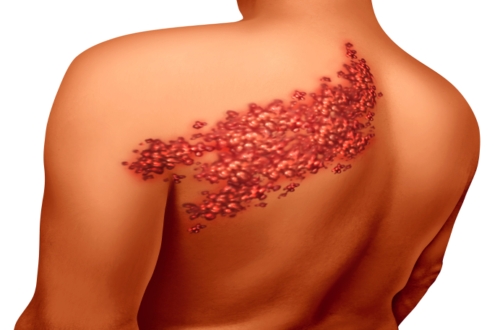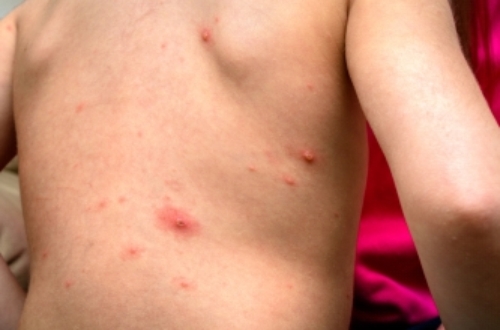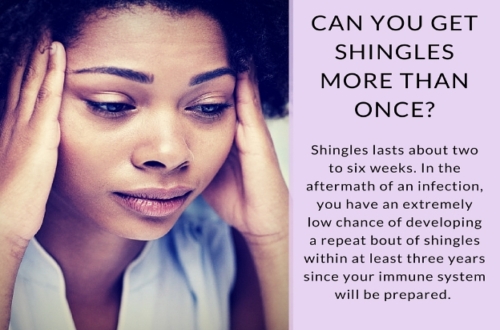 Shingles is a painful disease that is caused by the reactivation of a previous chicken pox infection.
Shingles is a painful disease that is caused by the reactivation of a previous chicken pox infection.
Since chicken pox is known to be a one-time illness, it’s reasonable to wonder if you can get shingles more than once or not.
The answer is a bit messy since it boils down to either “yes” or “yes, but not you specifically.”
There are several different risk factors for repeat shingles that affect how likely you are to develop the blistering encore.
What Is Shingles?

Shingles is caused by the varicella zoster virus, the same thing that causes chicken pox. Once you have a chicken pox infection, the virus can become dormant for years or decades before emerging later in life. What usually happens is that the virus, which has been sleeping in your nervous system, travels through the nerves into your skin once it reawakens. No one really knows why this happens, but the resulting disease is different enough from chicken pox to get its own classification and name.
Shingles Symptoms
In the first stage of shingles, pain is usually the only symptom. The pain can be very intense and has been described as an aching, burning, stabbing, or shock-like sensation. Shingles usually occurs along the torso, neck, or face (that is, in just one of these locations), and the location can sometimes mean that shingles pain gets mistaken for a lung, heart, or kidney problem. Although some individuals can experience only pain, most others will go on to develop some of the following symptoms (1):
- Numbness and tingling along with the pain;
- Sensitivity to touch (tenderness);
- A red rash that forms a band along the area (if you look at pictures of shingles and chicken pox, you will notice how much more tightly clustered shingles is);
- Itching;
- Fluid-filled blisters that eventually burst and crust over;
- Fever;
- Chills;
- Headache;
- Fatigue; and
- Sensitivity to light.
The rash, pain, blisters, and itching are the most common symptoms. It’s worth keeping in mind that shingles is contagious and you will be able to infect anyone who has not previously had the chicken pox or been vaccinated. If you infect someone, they will develop chicken pox instead of shingles since this will be their first encounter with the varicella zoster virus. Transmission requires contact with the fluid from the blisters, so you won’t be contagious once the blisters finish crusting over. Until then, take care to avoid close contact with pregnant women, people with a compromised immune system, or those who have never had the chicken pox.
Can You Get Shingles More than Once?
Shingles lasts about two to six weeks. In the aftermath of an infection, you have an extremely low chance of developing a repeat bout of shingles within at least three years since your immune system will be prepared, much in the same way that immunity builds up after a chicken pox infection (2). The difference is that this resistance declines over time, so you can get shingles more than one in a lifetime. The chance of this actually happening, however, varies. There are certain risk factors that make the risk of shingles higher.
- Post-herpetic neuralgia is considered a risk factor for getting shingles more than once. This is a form of long-term pain that persists for months or years after the shingles rash goes away and happens in about 10% of cases. The longer the pain lasts, the higher the risk.
- Women are 60% more likely to get a repeat of shingles than men.
- Being age 50 or older during the first case of shingles raises the chance of a repeat by about 40% .
Although uncommon, you can get shingles more than once in the same place on your body (3). Most repeat cases, however, tend to show up in a different location. If the first rash was on your left side, the next is more likely to be on your right or maybe on your face instead.

Treatment for Shingles
Shingles, much like the chicken pox, does not have a cure. Antiviral medications, especially if taken early on, can help reduce the risk of complications and speed up recovery of the blisters. Analgesics, numbing creams, or other pain relievers may also be prescribed to help manage symptoms. Since shingles can itch, many of the same itching treatments used for the chicken pox can work here as well. This includes things such as oatmeal baths, wet compresses, or calamine lotion.
There is also a shingles vaccine that the CDC recommends even if you have already experienced shingles since it can still help protect against recurrence (4). The vaccine is not 100% effective, but it does cut your shingles risk by roughly half and reduces the risk of post-herpetic neuralgia by around 67%.
The shingles vaccine is mainly recommended for people age 60 or older and should not be taken if you are still experiencing a shingles rash.
When to See Your Doctor

It’s always a good idea to schedule a doctor’s appointment if you start showing the symptoms of shingles since, although not normally dangerous, the illness can be extremely painful and distressing if left untreated. There are certain circumstances that warrant medical attention more than others, however. Any of the following should be considered risk factors for complications:
- The rash or pain happens near your eye. A shingles infection here can lead to permanent damage.
- You are 70 years of age or older, since the risk of complications rises with age.
- You or someone in your family has a weakened immune system.
- The rash is painful enough to impair daily activity.
- The rash is widespread and not limited to a single location.
Shingles is fairly common. About one in three Americans will end up developing shingles over their lifetime. Although you can get shingles more than once, repeat episodes are much less likely and only affect around 24 people per 10,000 according to one study. Vaccination remains one of the best preventative steps both against your first shingles infection and any future ones, so speak to your doctor about it if you are concerned about your risk factors.
Read Next:
